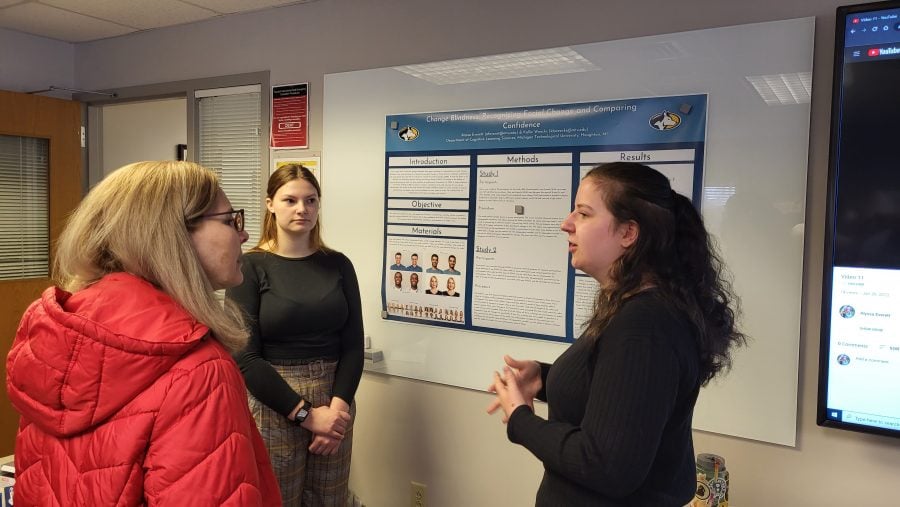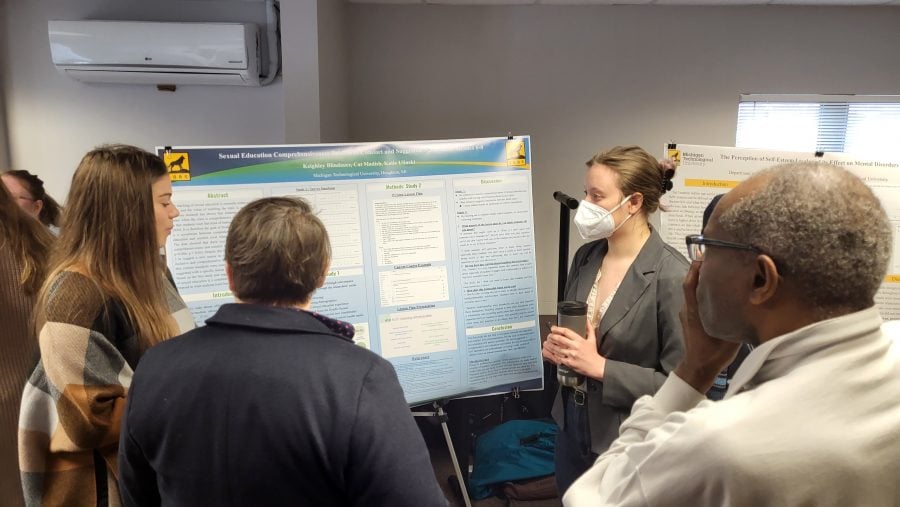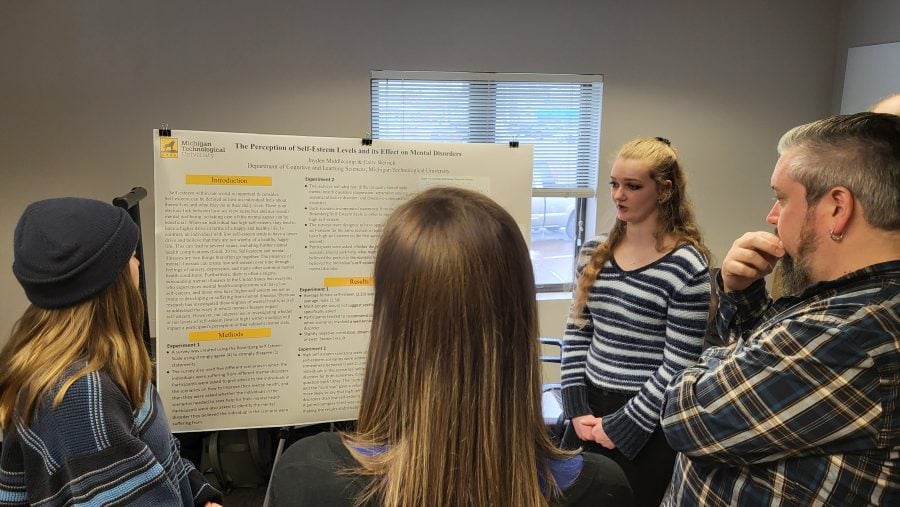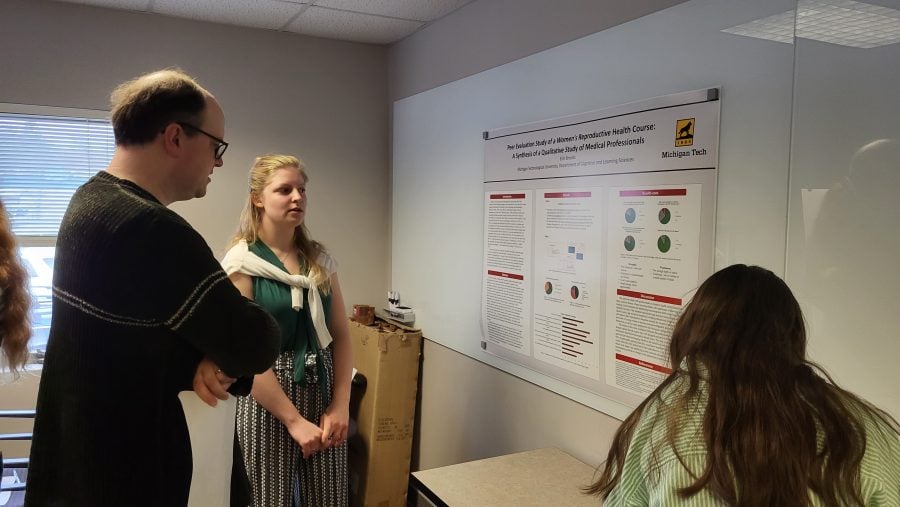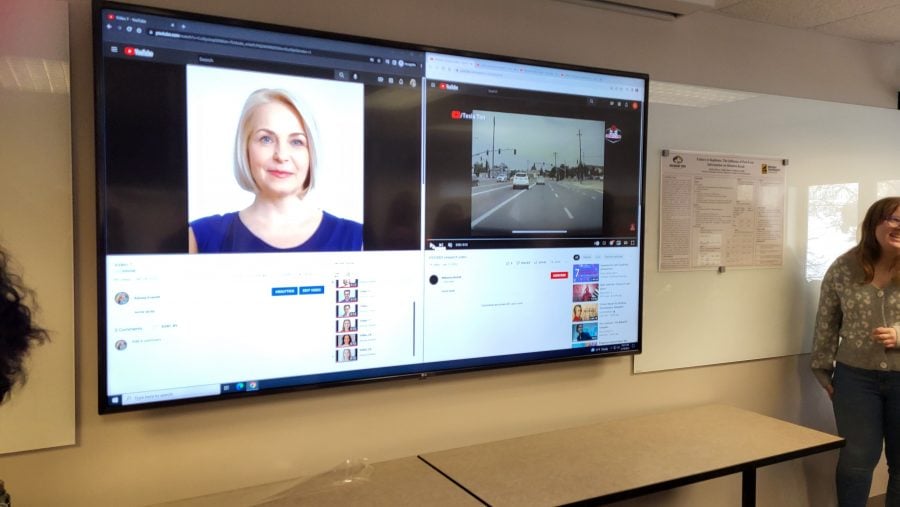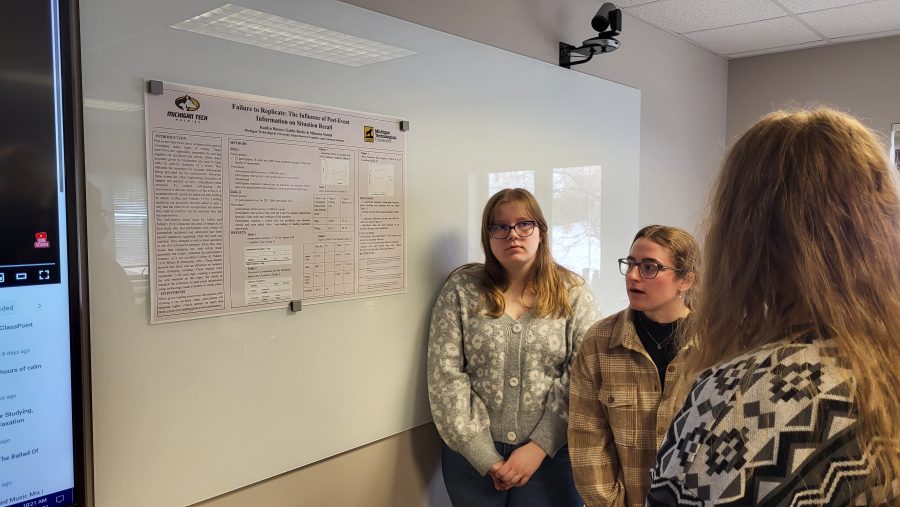On Tuesday, April 19, the PSY 3001 Research Methods class hosted a poster session presenting the research they completed during the last semester as part of the course. The course instructor and research advisor for these undergraduate students is CLS associate professor Dr. Shane Mueller.
There were seven posters from 15 students in the symposium with faculty staff and students attending the event.
The abstracts for each poster is listed below the photo gallery.
Peer Evaluation Study of a Women’s Reproductive Health Course: A Synthesis of a Qualitative Study of Medical Professionals.
– Erin Brooks
The education of young women has transitioned from health and sex education to what it implies to “get your period” and how to actively avoid pregnancy (Schmitt et al., 2021). Young women have the right to be taught the basics of their reproductive system and the skills to identify and understand their own health. In an effort to combat this lack of knowledge, studies have researched the knowledge of fertility awareness in individuals and where they received their education (Chowlowska et al., 2020; Armour et al., 2021). The goal of this two part study is to identify a gap in the knowledge of young women about their reproductive health and to design a course that would educate women about the information that was not taught to them. The study was of a two part design: the first was semi-structured interviews with women’s health professionals, and,the second part was a peer evaluation of a course that addressed this gap. The results of the first study came to a conclusive identification of an educational gap on the natural signs and patterns of a woman’s cycle, including misconceptions women have held about their own bodies. The peer evaluations also held a high rate of correlation in the direction that the knowledge presented in the short course was beneficial to them as individuals. These studies helped to bring to light the knowledge gap there is in the education of young women today and where there is room for growth, providing the basis for courses for future classes.
Failure to Replicate: The Influence of Post-Event Information on Situation Recall.
– Kaitlyn Baccus, Gabby Bosley and Makenna Nuttall
The purpose of this study was to explore the influence of post-event information on situational recall. We hypothesized that when given leading post-event information after viewing a dashcam video, participants will be less likely to accurately describe and remember the event than those who are not given leading post-information. Participants were randomly assigned to one of two Google surveys with questions to assess their knowledge of a dashcam video of a car accident they watched. Questions about the accident included filler questions and one key question about car speed. The results of the data did not support our hypothesis and showed that the non-leading group reported a higher average speed than the leading group. These results encouraged us to conduct a second study, this time a within-subjects study. Four surveys were created using older car accident videos and an attention-check video of a mountain bike accident. These videos were counterbalanced with leading and non-leading questions regarding the event that occurred in the videos. The key questions were again related to the car’s speeds. The results of this study showed that there was not a significant effect of verbiage on vehicle speed estimates between the conditions.
Comparing the Perceived Effectiveness and Difficulty of Memorization Strategies in Different Age Groups.
– Trenton Laramore, Abby Morley, and Samantha Walker
Previous studies on the use of mnemonics as a study technique have found that deeper analysis and longer processing time of material will enhance memory performance (Craik & Lockhart, 1972). However, there has not been much research on the comparison of mnemonic strategies. It is hypothesized that the Story Strategy (SS) would be more effective in free recall compared to the First Letter Strategy (FLS). An online randomized questionnaire assigned participants into four groups that watched two videos testing both strategies. After recall, participants were asked to assess difficulty and effectiveness. Results show that participants recalled more words using the SS compared to the FLS and thought the SS was more effective and difficult overall. These results suggest that deeper levels of processing are linked to better performance. This study leads to further research in our second study about how age impacts perceived difficulty and strategy performance. Participants were randomly assigned into two groups and watched four videos where both strategies were tested. Participants were then instructed to recall words utilizing the strategy they were given. After recall, participants were asked to subjectively assess effectiveness, difficulty, and usefulness. Results show that FLS was considered more difficult, while SS was considered more effective, but memory performance was not impacted by age for either strategy. Results suggest that use of memory strategies may successfully counteract organic mild effects of memory loss as we age.
Sexual Education Comprehensiveness As It relates to Comfort and Suggested Material for Grades 6-8.
– Keighley Blindauer, Cat Madish, and Katie Ulinski
The teaching of sexual education is currently under scrutiny by many and the value of teaching the topic is under question. Previous research has shown that students retain knowledge better when the class is comprehensive and inclusive as well as that students want that kind of instruction (Narushima et al., 2020). It is therefore the goal of study one was to discover if there is a correlation between comprehensiveness of past sexual education and comfort level when discussing sexual topics. The data showed that there was not a correlation between comprehensiveness and comfort level (Perarson’s correlation, p=0.886, p > 0.05). Despite this finding, it is the goal of the second study to suggest a new course in sexual education that is more inclusive and comprehenesive than pervious standards. To do this, current standards were compared and a new syllabus was suggested. A specific lesson plan was also suggested. Based on the first study and suggested materials, the teaching of sexual education is a constantly shifting field that needs to respond to what students learn best to.
The Perception of Self-Esteem Levels and its Effect on Mental Disorders.
– Jayden Middlecamp and Caity Weirick
Self-esteem and mental illnesses are two things that often go together, and the presence of mental illnesses can create low self-esteem over time through feelings of anxiety, depression, and many other common mental health conditions. There is often a stigma surrounding mental illnesses in the United States that everyone who suffers from them will have low self-esteem, and those who have higher self-esteem are not as prone to developing or suffering from mental illnesses. Previous research has investigated these stigmas of mental health, as well as addressed the ways in which mental illnesses impact self-esteem. However, our interest lies in investigating whether or not levels of self-esteem (low or high) will impact someone’s perception of that individual’s mental state. Two surveys were created in order to assess this and included four different scenarios with common, easily-identifiable mental disorders. Each scenario was accompanied by statements from the Rosenberg Self-Esteem Scale in order to imply low or high self-esteem without directly stating it. This allowed participants to get an impression of the person in each scenario. Following up, they were asked if they believed their self-esteem impacted their mental disorder. Results of this study were computed in a paired-samples t-test, giving a result of 0.008. Since the p value is less than 0.05, the null hypothesis is rejected and the results are statistically significant, showing that participants were more likely to say that high self-esteem impacted mental disorders compared to those with low self-esteem.
Change Blindness: Recognizing Facial Change and Comparing Confidence.
– Alyssa Everett & Kallie Weecks
Past research has shown that small changes often go undetected, which introduced a phenomenon known as “change blindness.” Research has also been done to show that the brain has a specific area called the Fusiform Face Area for recognizing facial features. However, little research has addressed which parts of the face changes often go unnoticed or how confidence affects detection. Utilizing the flicker paradigm, videos were developed to test if relevant changes were more easily noticed in faces and less susceptible to change blindness. The results from Study 1 showed that there was a significant difference between big and small changes, but irrelevant and relevant changes were not statistically different. This shows that the materials used in this study were well made to have big and small changes indicating that these videos could be used for further research. Study 2 used the materials from Study 1 to compare confidence to the ability to detect changes. This was done by showing a short clip of a video and asking participants to rate their confidence in identifying a change in the longer video. This found that there was a statistically significant correlation between the confidence and the accuracy of detection. This implies there may be the ability to detect a change before identifying what the change is.
Identity Formation Among Undergraduate Engineering Students at Michigan Technological University.
– Emily Grant
Sixty percent of Michigan Technological University (MTU) students are enrolled in an engineering program. Identity within one’s career has been a researched topic for many years and it shows that there is a high correlation between one’s success in their career and how much one identifies with their career choice. Social Cognitive Career Theory (SCCT) theorizes that an individual’s interests, choices, achievement, and satisfaction all interact with each other (Lent et al., 1994). To test and further understand this research two studies were conducted involving engineering students at MTU. These studies’ main goal was to understand and conceptualize how much identifying as an engineer can impact one’s success throughout their time at MTU as well as their success after graduating when thrust into the professional engineering world. Throughout this research, I take a look into the opinions and feelings of MTU engineering students to discover what it is that led them to pursue a degree in engineering. Using the Critical Decision Method (CDM) interview process involving 6 participants which preceded a survey/questionnaire that expands the sample size to 94 engineering students, I’ve Developed a qualitative model of students perceive themselves as engineers, whether any role models led them to this point, and finally, a sense of how MTU either supports or neglects the needs for engineering students to succeed and create a strong identity with their chosen field of engineering.
To learn about the latest in our undergraduate, graduate, and faculty research – follow us on Instagram and Facebook @clsmtu!
